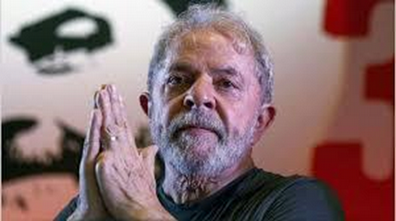Justice for Lula
The interviews of Lula with Brazilian and international media support the version that his condemnation is without proof, that it is political persecution against the Brazilian ex-President and that he is a political prisoner.
- Opinión

The interviews of Lula with Brazilian and international media support the version that his condemnation is without proof, that it is political persecution against the Brazilian ex-President and that he is a political prisoner. Moreover, that the political history of Brazil was distorted by the decision to prevent Lula from becoming a candidate for the Presidency of Brazil, an election in which, according to the opinion polls, Lula would have been elected in the first round. At the same time, the candidate launched by Lula, Fernando Haddad, would have won if not for the monstrous campaign of fake news, with scandalous lies propagated by robots.
Since the coup without constitutional motives against Dilma Rousseff, re-elected President of Brazil in 2014, hybrid war has been implemented; this new kind of coup, that is the present strategy of the right on an international scale, is based on a war of laws, the judicializing of politics and the political persecution of democratic leaders. A war that illegally involved the continued imprisonment and impediment of the candidacy of Lula and that ended with the farce of the election of Bolsonaro.
Justice for Lula involves not only the reparation of the injustices committed against him. It means denouncing the farce of Lava Jato–a farce repeatedly proven by the revelations made by The Intercept-Brazil–, unmasking its false combat against corruption, that meant bringing to trial, accusing and condemning those who put it into practice, at the service of the breakdown of democracy, the destruction of the Brazilian public patrimony in favour of the interests of the United States, and the elimination of the social policies of the PT and workers’ rights.
As the result of the Lava Jato investigation, Brazil has the most discredited government in her history at the international level, the most ridiculed President both within and outside of the country, who among other things emits absurd declarations daily, dishonoring the position he holds, while he promotes recession and leaves 14 million people in unemployment.
Meanwhile, Lula’s image continues to grow both in Brazil and abroad. Even people who had been swayed by the corruption accusations involving Lula, realize, now they are informed of the legal and political conditions of his conviction, that Lula is absolutely innocent, that there is not an undue penny in his accounts, that his trial is political. That he was condemned not with proofs, but convictions. There is no law that is not based on proof.
Lula reaffirms, for all those reasons, that he will only leave prison with his innocence recognized. He does not accept to avail himself of any other mechanism, not even house arrest, to which he would have the right as from October. Because this would involve recognizing the condemnation and appealing for house detention, to which a condemned person has a right after fulfilling 1/6 of the penalty. Lula does not recognize the condemnation. He will only accept leaving absolutely innocent.
That was a possibility that we could not see how it could happen, until the revelations of The Intercept challenged one of Brazil's greatest judicial absurdities: that the Supreme Federal Tribunal has indicated, several times, that Moro is qualified to judge Lula. After the circumstanced denouncements to the contrary, the conversations of Moro confirm irrefutably that he and the other judges of the Lava Jato had acted in a way that was openly political, including falsifying facts, to condemn Lula without proof, as an operation that was simply political.
The climate is becoming insufferable for the STF that cannot uphold Moro’s supposed qualification. It so happens that, if the STF were to become courageous enough to disqualify Moro, this would simply nullify all the trials that he had presided over against Lula, who would then go free. There are two pending decisions for the coming weeks or months on this issue.
Meanwhile, the government is increasingly eroded, fighting harder and harder even with the media. The president was hesitating on whether or not to give an inaugural discourse in the General Assembly of the United Nations, with the risk of demonstrations of repudiation inside and outside the UN. He is leaving the country without government, more concerned with obtaining the votes for his son to be the Ambassador to the United States and maneuvering so that his other two sons can evade trial for corruption.
This is the Brazil in which the person who should be ruling the country is imprisoned, in spite of being innocent, while the one who is in the Presidency should be in prison.
17/09/2019
(Translated for ALAI by Jordan Bishop)
-Emir Sader, Brazilian Sociologist and Political Scientist, is the Coordinator of the Laboratory of Public Policy of the Universidad Estadual de Rio de Janeiro (UERJ).
Del mismo autor
- Hay que derrotar políticamente a los militares brasileños 07/04/2022
- China y Trump se fortalecen 04/03/2022
- Pandemia e Ucrânia aceleram decadência da hegemonia norte-americana no mundo 28/02/2022
- Pandemia y Ucrania aceleran la decadencia de la hegemonía norteamericana en el mundo 28/02/2022
- La anti-política generó la fuerza de extrema derecha 22/02/2022
- Las responsabilidades del PT 10/02/2022
- Estados Unidos, más aislado que nunca en América Latina 03/02/2022
- Memoria y olvido en Brasil 27/01/2022
- 2022: tiempos decisivos para Brasil y Colombia 05/01/2022
- Brasil: una historia hecha de pactos de élite 18/12/2021
